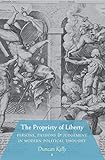The Propriety of Liberty : Persons, Passions, and Judgement in Modern Political Thought / Duncan Kelly.
Material type: TextPublisher: Princeton, NJ : Princeton University Press, [2010]Copyright date: ©2011Edition: Course BookDescription: 1 online resource (368 p.)Content type:
TextPublisher: Princeton, NJ : Princeton University Press, [2010]Copyright date: ©2011Edition: Course BookDescription: 1 online resource (368 p.)Content type: - 9780691143132
- 9781400836840
- 320.01/1 22
- JC585 .K39 2010
- online - DeGruyter
- Issued also in print.
| Item type | Current library | Call number | URL | Status | Notes | Barcode | |
|---|---|---|---|---|---|---|---|
 eBook
eBook
|
Biblioteca "Angelicum" Pont. Univ. S.Tommaso d'Aquino Nuvola online | online - DeGruyter (Browse shelf(Opens below)) | Online access | Not for loan (Accesso limitato) | Accesso per gli utenti autorizzati / Access for authorized users | (dgr)9781400836840 |
Frontmatter -- Contents -- Acknowledgments -- Abbreviations -- Introduction: The Propriety of Liberty -- Chapter One: 'That glorious fabrick of liberty': John Locke, the Propriety of Liberty and the Quality of Responsible Agency -- Chapter Two: Passionate Liberty and Commercial Selfhood: Montesquieu's Political Theory of Moderation -- Chapter Three: 'The True Propriety of Language': Persuasive Mediocrity, Imaginative Delusion and Adam Smith's Political Theory -- Chapter Four: Taking Things as They Are: John Stuart Mill on the Judgement of Character and the Cultivation of Civilization -- Chapter Five: Idealism and the Historical Judgement of Freedom: T. H. Green and the Legacy of the English Revolution -- Chapter Six Coda: Liberty as Propriety -- Bibliography -- Index
restricted access online access with authorization star
http://purl.org/coar/access_right/c_16ec
In this book, Duncan Kelly excavates, from the history of modern political thought, a largely forgotten claim about liberty as a form of propriety. By rethinking the intellectual and historical foundations of modern accounts of freedom, he brings into focus how this major vision of liberty developed between the seventeenth and the nineteenth centuries. In his framework, celebrated political writers, including John Locke, Montesquieu, Adam Smith, John Stuart Mill, and Thomas Hill Green pursue the claim that freedom is best understood as a form of responsible agency or propriety, and they do so by reconciling key moral and philosophical claims with classical and contemporary political theory. Their approach broadly assumes that only those persons who appropriately regulate their conduct can be thought of as free and responsible. At the same time, however, they recognize that such internal forms of self-propriety must be judged within the wider context of social and political life. Kelly shows how the intellectual and practical demands of such a synthesis require these great writers to consider freedom as part of a broader set of arguments about the nature of personhood, the potentially irrational impact of the passions, and the obstinate problems of individual and political judgement. By exploring these relationships, The Propriety of Liberty not only revises the intellectual history of modern political thought, but also sheds light on contemporary debates about freedom and agency.
Issued also in print.
Mode of access: Internet via World Wide Web.
In English.
Description based on online resource; title from PDF title page (publisher's Web site, viewed 29. Jul 2021)


